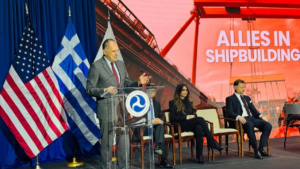
John Wobensmith, CEO of drybulk specialist Genco Shipping and Trading, looks back at the outlook for the logistics transport industry, which is facing great volatility.
With demand for vessels outstripping supply, and the Panama Canal reducing capacity, freight rates have once again risen significantly.
He also believes that environmental regulations will slow down the world fleet, which could lead to permanent freight rate inflation.
He also cites Chinese activity, demand for coal and iron ore, monetary policies, and the Indian economy.
Genco CEO John C. Wobensmith recently spoke with Alix Steel and Guy Johnson on Bloomberg TV about supply and demand fundamentals in the dry bulk shipping market, with inefficiencies created by the Panama Canal drought.
Genco´s CEO also discussed tensions in the Middle East, strong coal and iron ore demand in China, as well as the outlook for the macro economic environment and global shipping markets moving forward.
Wobensmith also pointed out that recently we had some attempted hijackings in the Gulf of Aden area, and these incidents create serious dilemmas. “If you decide not to go through the Panama Canal you are pushing more ships down through Suez and more down into the Red Sea,” he says.
“I think there is a component of permanent inflation on shipping rates. The overall fleet in general is slowing down to reduce the carbon footprint and meet the environmental regulations. There is a very volatile market.”
“When you have a situation like the Panama Canal which is the world´s biggest shortcut and being cut in half in terms of number of ships that can go through on a daily basis, you create inefficiencies in the market. When you have demand growth in China on the iron ore and coal and you have at the same time these inefficiencies in Panama, freight rates move up, something we have seen the last month.”
“If you order today a ship you have to wait until 2026 until you get it. There is not a lot of new tonnage coming out, as there are questions raised regarding the choice of the future fuel for dry bulk shipping and in general. So, to take the risk when you have a 25-year useful life on an asset and order a conventional fuelled ship today, that’s not make any sense. In 10 years from now we will be talking a lot about alternative fuels and there will be a lot of vessels ordered with alternative fuels.”
Watch the video below with John Wobensmith speaking on Bloomberg TV.


